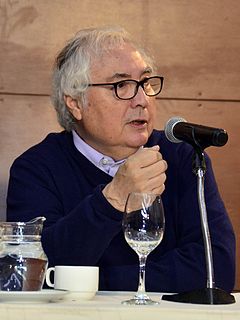A Quote by Manuel Castells
Power does not reside in institutions, not even the state or large corporations. It is located in the networks that structure society.
Quote Topics
Related Quotes
The domestic power structure - how power is exercised in the United States, for instance - greatly influences the structure of international institutions. So, for example, the Clinton administration was very influential in shaping the WTO treaty, and, because of the way the US domestic political system works, this meant that corporations could use the US government to wield a huge influence.
It is unfortunately none too well understood that, just as the State has no money of its own, so it has no power of its own. All the power it has is what society gives it, plus what it confiscates from time to time on one pretext or another, there is no other source from which State power can be drawn. Therefore every assumption of State power, whether by gift or seizure leaves society with so much less power; there is never, nor can be, any strengthening of State power without a corresponding and roughly equivalent depletion of social power.
Most persons think that a state in order to be happy ought to be large; but even if they are right, they have no idea of what is a large and what a small state.... To the size of states there is a limit, as there is to other things, plants, animals, implements; for none of these retain their natural power when they are too large or too small, but they either wholly lose their nature, or are spoiled.
There is a need to employ public memory, critical theory, and other intellectual archives and resources to expose the crimes of those market-driven criminogenc regimes of power that now run the commanding institutions of society, with particular emphasis on how they have transformed the welfare state into a warfare state.
Democracy no longer means what it was meant to. It has been taken back into the workshop. Each of its institutions has been hollowed out, and it has been returned to us as a vehicle for the free market, of the corporations. For the corporations, by the corporations. Even if we do vote, we should just spend less time and intellectual energy on our choices and keep our eye on the ball.
We have reached a stage where governments and political processes have been hijacked by the corporate world. Corporations can within five hours influence the vote in the U.S. Congress. They can influence the entire voting patterns of the Indian Parliament. Ordinary people who put governments in power might want to go in a different direction. I call this the phenomenon of the inverted state, where the state is no longer accountable to the people. The state only serves the interests of corporations.
The real difficulty is with the vast wealth and power in the hands of the few and the unscrupulous who represent or control capital. Hundreds of laws of Congress and the state legislatures are in the interest of these men and against the interests of workingmen. These need to be exposed and repealed. All laws on corporations, on taxation, on trusts, wills, descent, and the like, need examination and extensive change. This is a government of the people, by the people, and for the people no longer. It is a government of corporations, by corporations, and for corporations.





































